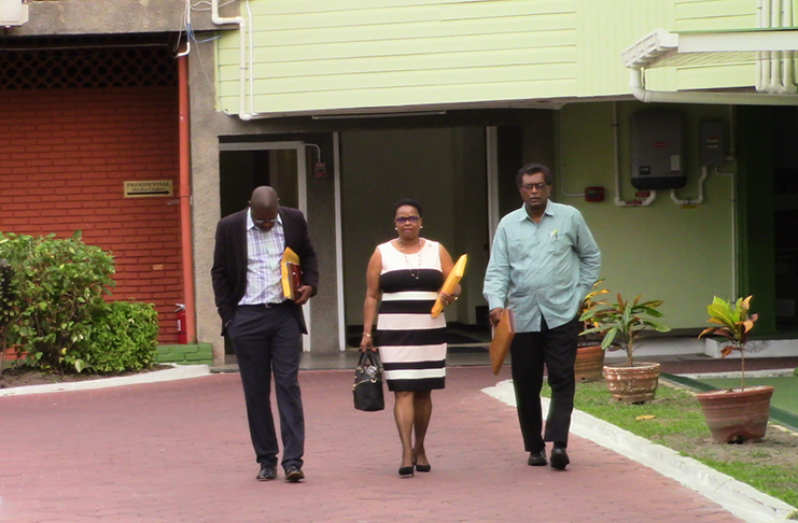…APNU, AFC to contest March polls as coalition
…agree to 70:30 ratio, five ministries for AFC
…President to head list, name ministers
By Svetlana Marshall
THREE months of rigorous, and at times, heated negotiations between the A Partnership for National Unity (APNU) and Alliance for Change (AFC) ended on an “excellent” note with the two sides agreeing on a revised Cummingsburg Accord.
The new accord, which is expected to be signed within days, will see the APNU and AFC moving into the 2020 General and Regional Elections as a coalition, as was done in 2015 when they brought an end to the People’s Progressive Party/Civic (PPP/C) reign in government.
The two sides struck a deal on Wednesday at the Ministry of the Presidency during a high-level inter-party meeting with Chairman of the A Partnership for National Unity, President David Granger and Leader of the Alliance for Change, Khemraj Ramjattan. APNU’s Chief Negotiator, Volda Lawrence and her counterpart David Patterson were present.
Emerging from the meeting with a smile on his face, Ramjattan, who was identified as the AFC Prime Ministerial Candidate, told reporters that the meeting was “excellent.” He said there should be no doubt that the APNU and AFC are entering the electoral battle field as a single unit. “Certainly, we are going into elections as a coalition, I can tell you that. Together is better,” the AFC Leader told reporters.
“No comments,” the AFC Chief Negotiator told reporters as he exited the Ministry of the Presidency’s compound. On the other hand, APNU’s Chief Negotiator made it known that the coalition remains intact. “We met and you will hear from us shortly. The coalition has always been strong. We are good, you will hear from us shortly,” Lawrence told reporters.
Though the APNU and AFC officials were tight-lipped on the contents of the new accord, Guyana Chronicle understands that the AFC – the smaller of the two coalition partners – agreed to receive 10 per cent less of the seats it had bargained for in 2015. Under the old Cummingsburg Accord, the APNU was allocated 60 per cent of the seats won by the Government in the National Assembly, while the remaining 40 per cent went to the AFC.
Under this new construct, Guyana Chronicle was told that the APNU and AFC have agreed to a 70:30 ratio– a formula which was proposed by the APNU. “It’s based on the perceived and real reduced electoral strength. I think it’s a reasonable argument. My sense is that the AFC acknowledges this, and would settle for a reduced portion of seats,” a source had explained to the Guyana Chronicle.
The formula will guide the allocation of seats in the National Assembly and at the level of the Regional Democratic Councils.
Last Monday – November 18, the APNU Executive met and agreed on a post-election formula for the allocation of seats in the National Assembly and the Regional Democratic Councils (RDCs). It is believed that the formula agreed upon on Thursday is in keeping with that proposed by the APNU Executive.
President Granger has repeatedly said that the coalition partners are better together. Last Wednesday, he explained that once the two sides agree on a revised Cummingsburg Accord, they will then move to establish a manifesto, paving the way for their elections campaign to be launched. Ahead of the negotiation, the parties had agreed to a number of core principles which guided the negotiations, and will continue to guide the coalition as it seeks a return to office when elections are held in March, 2020.
The Guyana Chronicle reported back in September that the parties had committed to upholding the Constitution of the Cooperative Republic of Guyana and to ensure that no agreement or action collides with or contradicts articles of the Constitution. This newspaper also understands that as part of the core principles, the parties agreed and committed to the establishment of a system of inclusionary democracy and the advancement of the country’s Green State Development Strategy, Vision 2040. They also committed to seeking electoral majorities at the general and regional elections and local government elections and agreed to select candidates for the aforementioned elections through participatory and transparent processes, which guarantee that candidates enjoy the majority of their respective constituencies and satisfy all legal criteria for election.
On the issue of allocation of seats in the National Assembly, the Cabinet, Regional Democratic Councils, Municipal and Neighbourhood Democratic Councils, the sides agreed that this would be done on the basis of a formula. The sides agreed too that the prerogative of the President to appoint members of cabinet and ministers and to assign specific ministerial portfolios is explicitly embodied in the Constitution and is inviolable.
Common manifesto, campaign
Meanwhile, other aspects of the core principles include the cultivation of respectful relations and at all times the parties will act collectively in the best interest of the coalition. They also agreed to speak with one voice on issues of public policy, to support a common manifesto and to issue joint media bulletins and releases on electoral matters.
Additionally, the parties agreed to abide by the principle of collective responsibility in respect of decisions emanating from Cabinet and to holding common positions on bills, motions and resolutions in the National Assembly. Each party also pledged to inform the other in advance of its inability at any time to support any measure in the National Assembly.
Other areas covered in the core principles are that of the publishing of a joint manifesto comprising 12 broad fields: constitutional reform, good governance, economic growth and development, education improvement, energy sector, environmental protection, indigenous peoples, infrastructural development, international relations, social protection and social cohesion, security and human safety, women, gender equality and youth.



.jpg)











